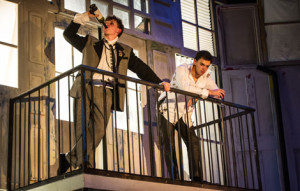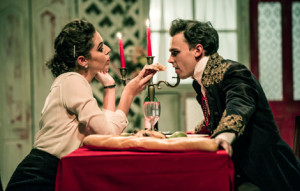Taking a 17th century comedy and making it genuinely fun and enjoyable for a contemporary audience without over-reliance on its farcical elements, old gags and physical comedy is an impressive achievement.
Terry Johnson’s adaptation of the London Cuckolds, written in 1681 by Edward Ravenscroft, is in excellent hands with the Richard Burton Company. Here we have the interesting idea of racing ahead three centuries to the early 1980s, the time of the New Romantics, the era of Thatcherite greed and a breakdown of society and social morality with a bit of male gender identity questioning added to the pot.
This manifests itself in the fashion that the characters wear, so we have Madonna-style hairstyles, bling and lace, Spandau Ballet glamour looks for the young men, and, most radically, the role of Engine played by a chap in full Boy George Culture Club costume and make up. This is contrasted well with the older men who are dull City lawyers/traders (so we have pinstripe suits and Gordon Gecko red braces). Slightly trickier is how to then deal with the characterisation of Wiseacres and the solution for him is to be from the country with flat cap and rural accent.
Luke MacGregor and Rhys Whomsley
The story line and theme is a pretty standard one for the 17th and 18th centuries and continues to find outlets to this day; men arguing about how to control their women, sexual and moral hypocrisy in high places and women outwitting the men. Here the debate is what makes the best type of wife, clever, simple or pious. It turns out, of course, they are far brighter than the men whom they outwit at every turn and innocence becomes the most dangerous quality.
The Pet Shop Boys “West End Girls” establishes the tone of that strange period in our social, economic and cultural lives. There are two fashionable hormone-driven young rakes on the look-out for a good time although one is more interested in the pleasures of the bottle than bed yet as the farce develops he is the one who has the sexual successes as his friend’s plots all go wrong. So we have the rather silly and hapless Ned Ramble who gets into the women’s houses but his equally dissolute but likeable companion Frank Townley who stumbles into their beds. Played by Rhys Whomsley and Luke MacGregor the two boys are splendid in their charming acting, polished characterisation and the added bonus of being able to really sing those Spandau Ballet anthems which must be a great relief to sound engineer Rosie O’Toole.
Georgina Theodoulou and Rhys Whomsley
It is, however, the women who are leading the game, not their husbands, as they plan secret liaisons in their husbands’ houses while the men are out on yet another scheme or other. As the manipulating wives the apparently pious Eugenia and the feisty Arabella, Georgina Theodoulou and Maeve Wells are full of personality. They also sing and/or dance along to 80s classics with Madonna’s Like a Virgin particularly apt. It is interesting how we warm to these adulterous wives and revel in their philandering probably just because it shows up the men rather than as being any great heroines.
There is an extra element added with a third way of controlling a wife put forward by the “country man” who argues innocence is the solution and so has kept his orphaned niece away from the influences of London life and now wants to marry her and coach her on how to be the ideal wife. Her innocence turns out to be more of a problem for him than benefit as, like a child in the sweet shop, she laps up sexual pleasures when she slips into the hands of the lads. Clara Gibbs plays the innocent Peggy with a cheeky glint in her eye and her innocence is vital to not only drive forward the plots but also to act as a mirror to the morality of the others.
Shaun Miller, Clara Gibbs, George Naylor, Jack Hammett, James MacCullum and Maeve Wells
The foolish husbands are played by Jack Hammett as the smug City slicker Dashwell, James MacCallum as the deluded pinstripe suited lawyer Doodle and George Naylor as the cynical controlling Wiseacres, who in this quasi morality (or immorality) tale all share the blinkers of their sex and therefore become the victims of the women.
Quite whether the imposing Ross Ford as Valentine Loveday the former lover of Eugenia is portrayed as another male victim is trickier. He is a love-struck romantic who is not recognised thanks to a false moustache and German accent. Ford also delights in the daft magic tricks scene where he conjures up the hiding Ned Ramble as if out of nowhere (in reality he is hiding under a table). Even more intriguing is the casting of Shaun Miller as Peggy’s Aunt. I am not sure whether it was just done for humour or was saying something bigger, I just don’t know. Similarly, the representation of the pivotal role of Arabella’s maid Engine as Boy George lookalike (and singalike as he sings Culture Club songs), was an even stronger gender questioning decision. Chante Adams as Eugenia’s maid Jane is played as a naughty and funny character in contrast to Tim Preston’s scheming Engine, a money-grabbing, slightly sinister representation. Ellie Birch has excelled with the costume designs.
Maeve Wells and Georgina Theodoulou
Yes, there is plenty of Whitehall Farce comedy, a bit of slapstick, mistaken identity and erection jokes, convoluted quick thinking, excrement and farts, but there is also lots of far more subtle humour conveyed in a facial expression or gesture from the ensemble. The large cast is completed by Heider Ali, Connor Calland and Jonny Green with a gaggle of comedic roles.
David Bond has invigorating direction and the talented cast has boundless energy and panache within Cerys Lewis’ flexible set composed of doors and windows that are both actual for the narrative and representative of the theme of marital fidelity and breaching that fidelity.
Richard Burton Company
Royal Welsh College of Music and Drama
Main image: Rhys Whomsley and Maeve Wells
Do you know about Arts Scene Wales? Please visits: https://asiw.co.uk/about-us/



